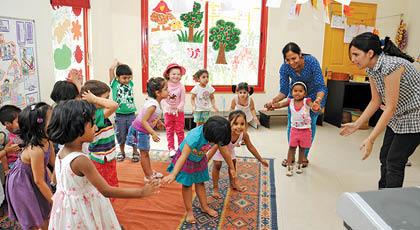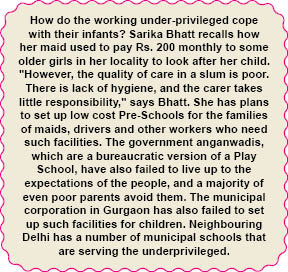
Photo: Prakhar Pandey
A child begins to learn from the moment she is born, and every sight and sound she sees or hears is a stimulus in this process. The environment around a child shapes her personality. In the days of yore the large joint families - grand parents, uncles and aunts, and cousins - would provide the support and learning for the growing child. However, in modern India, and especially a Millennium City like Gurgaon, where a majority of the families is nuclear and both parents are working, the role of the extended family has been taken over by Pre-Schools (also called Play Schools). They have mushroomed in every nook and corner of the City. A large majority of the working parents define these ‘schools’ as a boon - nay, a blessing - and say that they don’t mind paying high fees as long as the school is providing good quality care, food and transportation. However, there is no one regulating these Pre-Schools (definitely not the government). There is no one prescribing any rules, and there are no set standards. The Pre-Schools don’t require a licence. It seems that anyone with two rooms and a capacity to hire a few ‘teachers’ and some maids can start a Pre-School in Gurgaon. However, despite this lack of norms, rules or standards, the working parents are not complaining. They are happy that there is someone out there to take care of their kids while they work their way to the top of their corporate or social ladders. Sarika Panda Bhatt, a professional, has nothing but praise for the Pre-School where she sent her kids. She says that they spent quality time there and also learnt a lot of things. "I searched hard for the best Pre-School for my child. I wanted to ensure that she spent quality time when we were not around. The top priorities were safety, the quality of food being served and good transport,” says Panda. She adds that a thorough search of Pre-Schools should be conducted, and instead of sending the child to a fancy ‘corporatised’ school, one should look for smaller places that dot the neighbourhood, because most of these are ‘family run’. One of the parents got a call from a big school in Palam Vihar, promising a special discount. "When I went there they said that the admission fee is only Rs 300. However, by the time they added the development fees, annual fees and several other heads, the total went up to Rs 70,000 - excluding the monthly fees and transport! The fees and transport comes to a further Rs. 6,000 monthly," says the shocked parent. In fact the fees for a Pre-School toddler and someone seeking admission in Class 12 is almost the same. Another Pre-School that has its chains spread in almost all parts of the country - and in Gurgaon as well - calls up parents with promises of special discounts, and when they land up with the hope of getting a good deal they get a shocker. The parents, especially the ‘corporate ones’, are still not complaining. In fact they are happy that the mushrooming of Pre-Schools has helped bring down the age of enrolment to these nurseries to 1.5 years – from the earlier 3 years. A school owner says that the IT and corporate boom in Gurgaon has ensured that this business remains booming, and some parents are even pushing her to admit ten-month-olds in her Pre-School. She even gets ‘seat booking’ calls from parents who are expecting a child! Even when told that the glossy Pre-Schools are nothing but crèches, parents are fine with paying through their nose. Sonia, whose niece goes to a Pre-School, says that even though they live in a joint family, they still send the child to a Pre-School and pay Rs. 15,000 monthly, because of the ‘prestige’ issue. "In Gurgaon you need to conform to the standard of the peer group. Living in a gated complex or condominium also means that parents have to follow certain standards while choosing a Pre-School… and various other things," she rues. Mamta Dhingra, who is a professional, says that people in Gurgaon are ready to pay if the quality is good and the school is providing good care. Parents will pay a lot to have peace of mind. "The Pre-Schools are being run by decent people in a clean and healthy environment. We earn well, so there is no harm in paying someone who does a good job for our children," she says. She recalls how the Pre-School to which she sent her kids used to send emails and SMSs to keep the parents in the loop.

The problem, however, is that only the higher income families are able to send their children to Pre-Schools. Also, the majority of Pre-Schools are not ‘schools’, in the sense that they do not impart learning and skills to the impressionable young minds. Most act as day care facilities for children whose parents are working, or as refuges for bored housewives. Despite the ubiquity of Pre-Schools, questions are being raised about their need and importance to children and society. The need for such institutions, not only in India but even in US, which is the mecca of Pre-Schools and where 85 per cent of children go to these schools, is increasingly coming under the scanner. A radical, large study in the US indicates that children who attended Pre-School, and those who did not, had zero difference as far as their learning, knowledge and skills were concerned. This study compared elementary school children who attended the Federal government's Pre-School program, Head Start, to children who didn't. In India, however, there is no such research or monitoring, and the free market is just being allowed to satisfy these neo-urban demands. Neru Kumar, an educationist who has headed large schools in Delhi and Gurgaon and runs a Pre-School that caters to both the middle and lower middle class in the heart of Palam Vihar, says that Pre-Schools play an important role for the impressionable young minds, as they have taken the place of the large joint families. "With most parents working, the Pre-Schools, which also add up as day care centres, are a boon here. Parents should choose the school carefully, keeping in mind that more than the large buildings and glossy infrastructure, it is the people running the show that matter," says Kumar. Her school follows a structured method for teaching the young kids. When they enter the school they are slowly trained to handle their peer group; the kids also need to be able to handle the withdrawal from their family. "We help in improving the motor skills, oral skills, speech and language of the children," she says. When asked about the high cost, Kumar says that a lot of money has to be spent in retaining good teachers, hiring maids and creating learning systems for the kids. "The big schools are constantly on the lookout for good teachers, the maids leave for their villages, and hiring honest drivers is another big headache," she says. However, she admits that the fees in some of the schools have indeed become irrational. Sunita Bhardwaj, Principal of Spring Blossom, says that pre-schooling is very important because this experience helps in developing a strong and healthy brain architecture, as a child's brain grows to 90 per cent of the adult size by the age of five. She says that children from her school have turned out to be good students, score well in both academics and co-curricular activities. "Pre-Schools also prepare the child for schooling, and improve her literacy skills as well as her social and emotional development. The children get to know how to care, share and communicate. Some important soft skills, which are now becoming a prerequisite for success in life, are learnt early here," asserts Kumar of Kids Habitat. She however warns the parents to look for schools that are run by experienced educationists, which have less focus on making money and more on developing children. She is an experienced speech therapist as well. Kumar recalls that when she was a teacher, the Pre-School where she sent her child would ‘sedate’ the kids to keep them silent. The parents need to be very careful in choosing a school. Sandeep Kumar, a parent who lives in Palam Vihar Extension, says that the Pre-School charges exorbitant fees, but they have little choice as there are no play grounds, parks and recreational facilities in their area. "Where will the kids go? We do not want them to keep on watching television and movies. And the women of the house are not skilled enough to teach them," says Kumar. Education experts agree that the toddlers these days are difficult to handle, as they have better grasping power and knowledge and a lot more exposure. "They have too much energy, which needs to be well-channelised," adds Kumar. Some people are of the view that the government must step in regulate the Pre-Schools, as many have just become money minting machines. While a number of Pre-Schools offer ‘world-class’ education, most of their promises turn out hollow. An expert view is that we first need to analyse whether kids need to go to Pre-schools at all. If required, then these ‘schools’ should be regulated and monitored with help of subject experts. There should be uniformity in the syllabus, and a clear agreement on what skill sets should be imparted to children at this tender age. The standardisation will also help parents make simpler and less expensive choices. Of course there is also a bigger message here. Everything in this City cannot be ‘Make for the Top 20 per cent’ - while the rest scrounge for the bare necessities of life – including basic schooling, healthcare and housing.

Pre-School Learning Systems
Montessori method
A typical Montessori classroom has one trained teacher and one aide. This mixed-age-group class allows children to socialise with each other (as most learning is social). It is a developmental programme that considers the nature of the child and tailors the activities to her needs. Activities stress the independence of the child, allowing her to experiment with any material that catches her fancy. There are no grades, rewards, or punishments - the goal is improvements in behaviour, the level of work and the child’s sense of contentedness.
Playway method:
Early months spent by a child in a Playway school are meant for bonding with her friends and teachers. The child moves around the class freely, choosing what she wants to do and making friends. An important developmental goal is confidence and participation. Other goals include independence, patience and cooperation. The entire curriculum is based on little experiments and activities that focus on introducing a new concept. Poster making, doodling with crayons, pottery, lawn walks and simple games using balls and plastic bats are typical school activities.
Waldorf method
It recommends limiting a child’s exposure to electronic media and television, to prevent curbing her natural imagination. It is more teacher-oriented and encourages children to make their own toys from given materials like paper and clay, and to think for themselves. A child’s work is imagination, they say. A lot of emphasis is placed on fantasy and creativity; it encourages pictorial representations. The method does not use traditional testing or examinations. Free play within classrooms, which resemble homes, is common, as is outdoor play. To expose children to nature and seasonal changes, the curriculum strives to be emotionally supportive.
Reggio Emilia approach
The teacher collaborates with the parents and guides the children in their activities. She is seen as a co-learner or co-researcher. Parents are an integral part of the system, and are expected to interact regularly with the teacher and provide their input and feedback. The environment is considered the third teacher - after the teacher and the community. Drawing, sculpting, dramatic theatre and long term projects are the pillars of this method.
Read More...